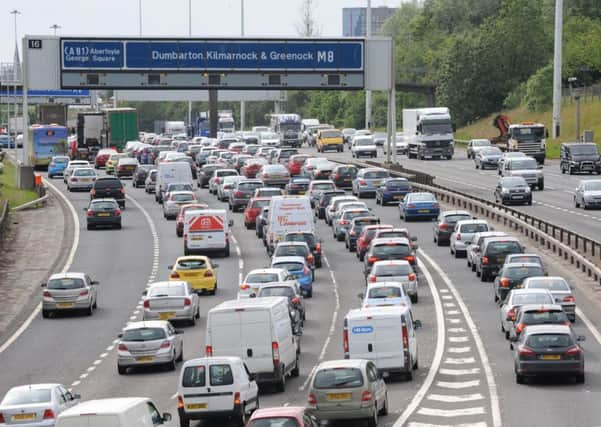Scottish road congestion is worst for six years


The number of motorists experiencing delays last year increased by 2 per cent to 11.7 per cent.
It came as traffic reached a new record of 44.8 billion vehicle kilometres, up 2 per cent on 2013 and topping the previous peak of eight years ago.
That is the equivalent of six times the distance to Pluto.
Advertisement
Hide AdAdvertisement
Hide AdThe number of vehicles on Scotland’s roads was at its highest for at least a decade, which also increased by 2 per cent to 2.8 million.
New vehicles, most of them cars, were also at a ten-year high, with 262,200 registered last year.
The survey showed cars accounted for more than six in ten journeys, but other forms of transport are becoming more popular.
Train travel on ScotRail, although covering only one in 50 trips, increased by 7.5 per cent last year and by 20 per cent over the last five years.
Cycling, accounting for one in 100 trips, was up by 3 per cent, and 18 per cent in the last five years.
However, bus travel fell by 1 per cent, and by 8.5 per cent in five years.
Ferry trips grew by almost 1 per cent in 2014, but were nearly 5 per cent down on five years ago.
Air travel was up by 7 per cent over the last five years - with half of that increase in 2014.
Advertisement
Hide AdAdvertisement
Hide AdFriends of the Earth Scotland blamed the increased congestion on road building, which has a £695 million budget this year for motorways and other trunk roads alone.
Director Dr Richard Dixon said: “You reap what you sow and increasing congestion is an inevitable consequence of continuing to invest in big roads and major bridges.
“So far, Scottish Government transport policy has been about more of everything.
“It needs to continue to be about more cycling, walking and public transport, but success will only come when we have fewer cars clogging up our cities.
“We need a major shift in spending away from roads and into the alternatives.
“Changing transport priorities is essential if we are ever to meet safety standards for air pollution, reduce climate emissions and make sure the essential traffic can get to where it needs to go.”
Colin Howden, director of sustainable transport campaigners Transform Scotland, said: “The continued fall in bus patronage is very worrying.
“While the national transport budget continues to rise, local authorities’ transport budgets remain squeezed.
Advertisement
Hide AdAdvertisement
Hide Ad“The Scottish Government should be doing much more to incentivise local authorities to invest in better local bus services.”
However, a motoring group said roads investment was money will spent.
Neil Greig, the Scotland-based policy and research director of the Institute of Advanced Motorists, said: “Governments both north and south of the Border are once again playing ‘catch up’ as the end of the recession predictably leads to more traffic.
“For Scots drivers, there is some hope just over the horizon as major new schemes come on line across Scotland which will remove long-established bottlenecks.
“Investment in road schemes traditionally brings much greater economic returns than investment in public transport, but both are required.”
A spokeswoman for the Scottish Government’s Transport Scotland agency said: “Car use is still high and, as these results show, there is a public perception of increased congestion.
“We are aiming to continue to tackle emissions and congestion by identifying ways to optimise capacity on key congested routes while also encouraging a greater number of journeys to work by public and active travel [walking and cycling].”
Commenting on the rest of the report, she said: “These latest figures show some very positive signs, particularly around the healthy increase in rail passenger numbers and the distances cycled over the last five years.
Advertisement
Hide AdAdvertisement
Hide Ad“In addition, satisfaction levels with public transport now stands at 75 per cent in 2014, up from 71 per cent in 2013.
“We are not complacent though, as we know there is work to be done to encourage people to use more sustainable and active travel modes.
“Our record investment in rail has seen 27km (17m) of new railways in recent years, a figure that will increase when the Borders Railway opens next week.
“We continue to spend around £250m each year supporting the bus network and concessionary travel.
“Working with local authorities, industry and user groups, our aim is to improve services by encouraging better engagement including when services change.
“The rise in distances cycled is encouraging and a clear indication the £40m funding we have placed in cycling and walking projects across the country is money well spent, but we recognise we have work to do to get more people cycling to work.”